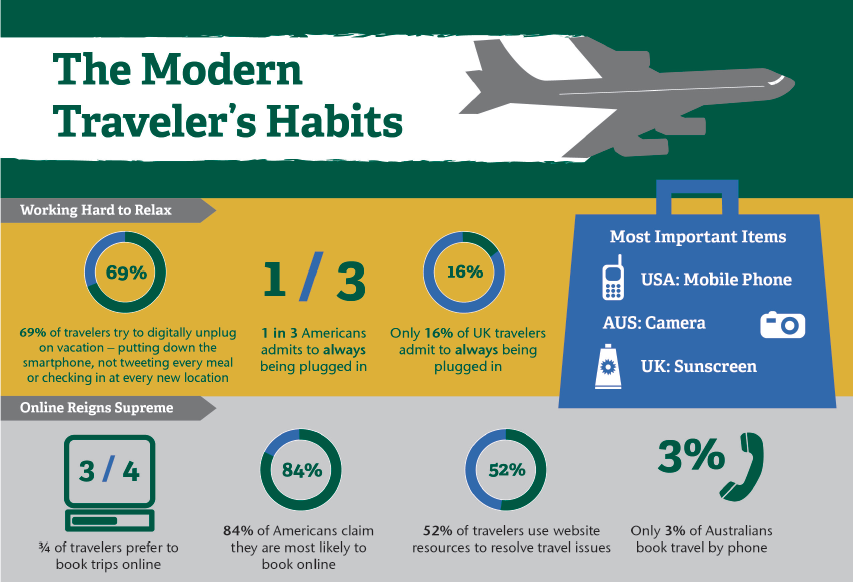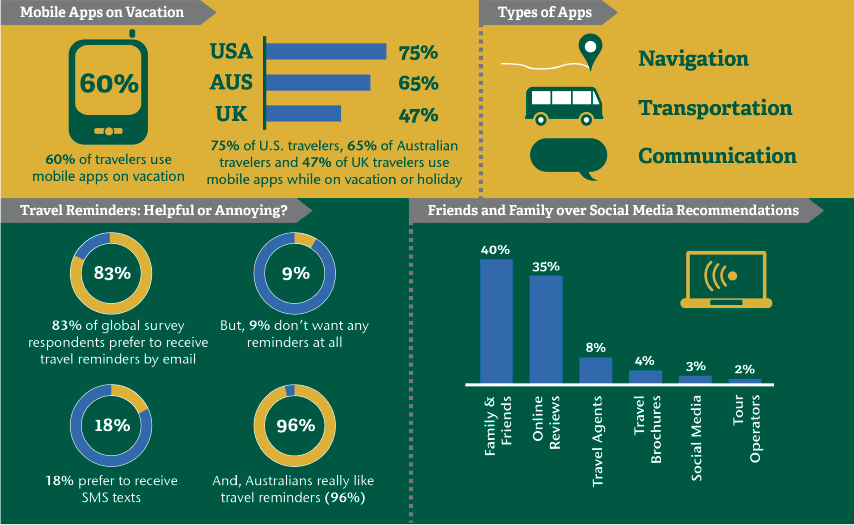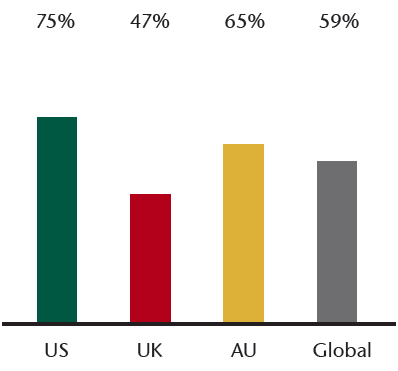
Customer engagement in the travel industry represents a paradox. Depending if you are traveling for business or leisure – this distinction is blurring more and more nowadays – some people want to be connected and online throughout their experience while there is a growing need and trend for travelers to unplug while away on vacation.
For travel industry stakeholders, there is therefore a challenge to tap into the communication channels reaching the right people at the right time. As highlighted in a recent study, The Modern Traveler – A Look at Customer Engagement in the Travel Industry, “marketers today need to deliver personalized and relevant content and services to travelers at the right time and across their preferred channel (email, text, phone call).
The rise of mobile travel
It’s critical that travel providers understand each customer not as a marketing segment, but as an individual so that they can deliver personalized offers via the most appealing channel, whether it’s a website, mobile device, email or social media.”

SDL Campaign Management and Analytics surveyed 4,000 consumers in the United Kingdom, United States and Australia. Highlights from the results indicate that:
- Vacation is truly the last vestige of relaxation
- Online reigns supreme…when it comes to booking
- The online experience isn’t matching up with people’s in-person experience
- Vacationers aren’t as active on mobile as they are during their non-vacation lives
- Friends and family recommendations win out over social media for travelers
- Surveys are the key way for people to share feedback
- Price beats loyalty for many consumers
Friends and family influence
While most of these findings seem intuitive and align with many other recent findings, I found it surprising that friends and family recommendations win out over social media for travelers. Does “social media” here include user-generated content & review sites such as Tripadvisor?
Many other studies found that review sites actually surpass friends and relatives as a dominant trusted source in the planning stages for travel. Findings of this study also found that friends and family recommendations influence vary per country, with the US standing at 64% and the UK at 43% compared to a global average of 53%.
MOBILE RULES… SORT OF
As much as smartphones have become a new must-have travel device, those who unplug are stepping away from technology while on vacation:
- More than 40% of global respondents admit they don’t use mobile apps while on vacation;
- Travelers are waiting to share stories and pictures about their vacations via social media until AFTER they return. Nearly 1/3 of survey respondents do share their vacation experience but again, not until they return;

Breakdown of global travelers using mobile apps on vacation - The digital unplug also means not tweeting every meal or checking-in at every location.
What’s interesting to see is how much mobile apps are being used on vacation depending on where travelers are from.
Findings from this study tend to confirm that Americans are hooked to their mobile devices more so than the British, who seem to have more success in letting go during their vacations.
And what do they use their mobile apps for? Here’s the top 3:
- Navigation (maps, location-based apps) : 42%
- Transportation (airlines, airports, trains, etc.) : 27%
- Communications : 27%
PRICE BEATS LOYALTY
One last dimension surveyed in this study referred to travelers and their use of loyalty programs. It truly seems like reward programs’ glory days are behind us and seen as a commodity, at best, with more than 25% of global survey respondents not part of any program at all.
Among the regions surveyed, 37% of U.K. travelers don’t belong to travel loyalty programs. This is a much higher rate than in the United States (19%) and Australia (13%).
More importantly, it seems that with social media and the ever-increasing presence of collaborative networks, travelers can find their own perks and deals without having to enroll in loyalty programs, specially if they are only offering frequent flier miles.
Travel marketing experts who innovate in this field may be able to tap into some pent-up demand and build rapport for better loyalty with their best clients.









Leave a Reply